 Title: The Charmed: Fascinatus
Title: The Charmed: Fascinatus
Author: Alan Southall
Publisher: AuthorHouse
ISBN: 978-1-5462-8739-1
Pages: 110
Genre: Mystery, Historical fiction
Reviewed by: Tara Mcnabb
Pacific Book Review
In this startlingly vivid work of fiction, Alan Southall takes the classic idea of a curse and turns it into a lively mix of ancient history and modern intrigue. Beginning in 105 AD and continuing all the way to 2020, The Charmed: Fascinatus brings together many contrasting characters whose lives are changed in different ways by a mysterious bracelet which seems to wield a hypnotic allure over the owner. Crafted in ancient Rome, it has the power to bestow both pleasure and suffering on the wearer, even death. This premise sets the stage for the clever dramas which unfold, managing to shine a not-so-flattering light on the darkness which can reside in the human soul.
Divided into sixteen different stories, each chapter corresponds to a numbered link in the bracelet, ultimately ending with ‘The Faulty Clasp.’ To make things more interesting, each link is inscribed with ancient Latin writing; messages of foreboding and danger to the bracelet’s current owner. Not surprisingly, the trinket ignites all sorts of heartache, greed, and melancholy among its victims. The most unsettling ability of the bracelet, however, is that it somehow manages to cause the tragic and violent death of many of its owners.
After being found accidentally by an innocent middle-aged couple in an excavation site, the bracelet seems to take on a life of its own, heavy with meaning and hidden agendas. Naturally, the couple is eager to learn more about this mysterious piece of jewelry; where did it come from, who did it belong to? They soon get their chance when they meet a man whose lineage is connected with the origins of the bracelet, all the way back in ancient Rome. The man is obviously nervous at seeing the charm, and hesitates before telling the wide-eyed couple the bracelet’s troubled past.
But it’s just a piece of metal, right? How could such a small thing possibly influence one’s fate, let alone one’s mood? Surely the bad luck associated with the charm is just pure coincidence…or is it? The author lets the reader stew in these questions while enjoying the sense of dread that grows stronger with each turn of the page. The fascination we have for the macabre and the unexplained, our obsessive fear of death, and our conflicting ideologies on free will are all tightly wrapped within the narrative, forming the very heart of the story.
Even for all our technological progress, mankind has yet to discover the secret of fate. Perhaps someday we will. But until then, we must rely on our more basic instincts, for better or worse, to see us through the unknown.

